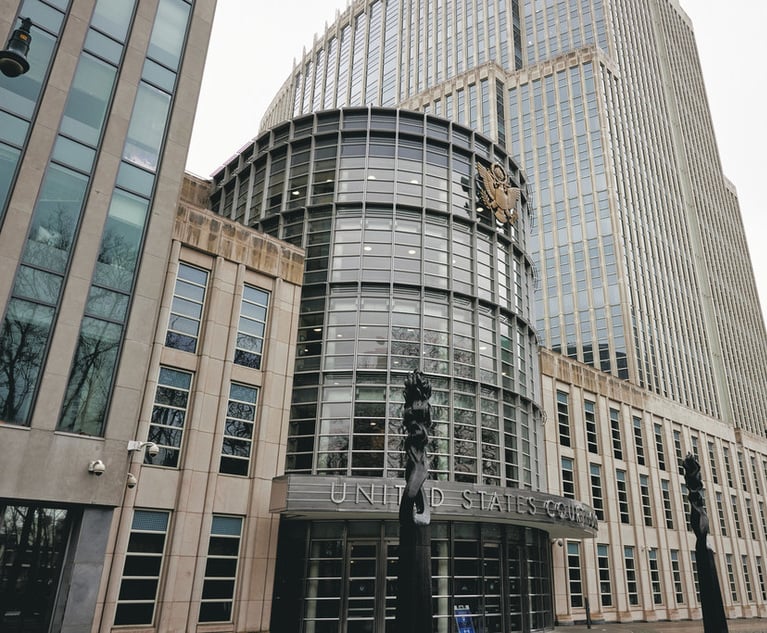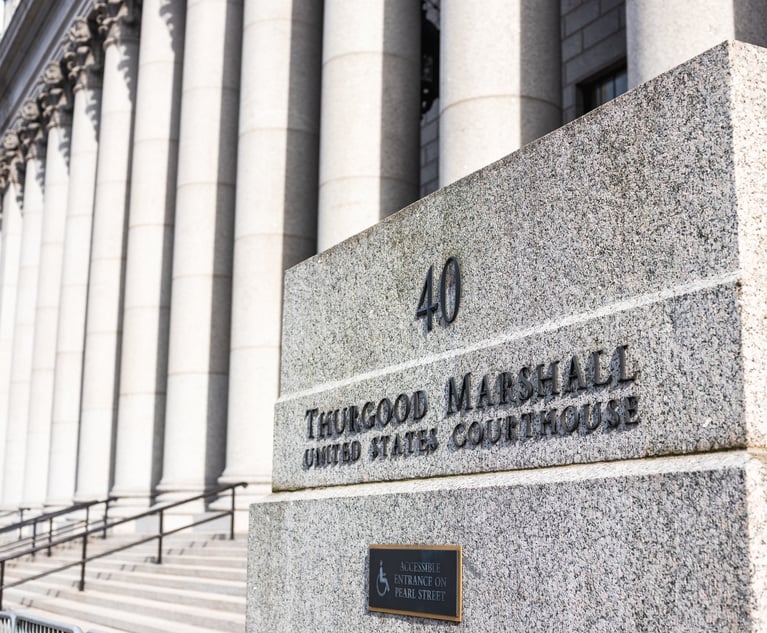Client Intake: Know Your Client—Or Else
In his Professional Responsibility column, Anthony E. Davis discusses two cases while exploring an issue critical to lawyers' and law firms' professional and business interests: What information about a new client does a lawyer need to obtain in order to make sensible decisions about whether or not to proceed?
July 04, 2017 at 12:00 AM
8 minute read
This article explores a subject that is only tangentially related to the Rules of Professional Conduct (unless a conflict of interest is involved), but which is central and critical to lawyers' and law firms' professional and business interests: What information about a new client does a lawyer need to obtain in order to make sensible decisions about whether or not to proceed? Two recent cases, one from New York and one from the U.K., have important lessons for lawyers, wherever they practice.
'P&P Property'
In reviewing the English case, P&P Property v. Owen White & Catlin, 2016 WL 05484797 (UK High Ct. of Justice, Chancery Div. 2016), it is important to note that English lawyers operate within a regulatory framework that requires them to undertake detailed “know your client” investigations about prospective clients, based on U.K. anti-money laundering (AML) laws. In addition, if lawyers find that a prospective client may be seeking assistance to violate the AML laws, they are required to report their suspicions to the authorities—without regard to attorney-client confidentiality.
The Case: The purchaser of a London property sued the seller's attorneys after a fraudulent real estate transaction fell apart, alleging breach of warranty of authority, negligence and breach of trust and undertaking. The seller's attorney was contacted by the purported owner of unoccupied real property in London to sell the property. The seller contacted the attorney from Dubai, claiming that he, as seller, needed cash on an urgent basis to purchase a property in Dubai.
The attorney and seller met in person at the law firm's office in London. The seller presented a passport which the attorney later claimed contained a good likeness of the seller. To comply with the U.K. AML regulations, the law firm arranged for an anti-money laundering search for the seller , which came back marked as “referred”—meaning that further inquiry about the seller was required. The attorney requested and obtained additional information from the seller to confirm his identity and address, including bank statements and the completion of documents by a local Dubai solicitor all of which appeared to confirm the seller's identity.
This content has been archived. It is available through our partners, LexisNexis® and Bloomberg Law.
To view this content, please continue to their sites.
Not a Lexis Subscriber?
Subscribe Now
Not a Bloomberg Law Subscriber?
Subscribe Now
NOT FOR REPRINT
© 2025 ALM Global, LLC, All Rights Reserved. Request academic re-use from www.copyright.com. All other uses, submit a request to [email protected]. For more information visit Asset & Logo Licensing.
You Might Like
View All
Lessons in Mediation & Negotiation: Attorneys' Reflections on Jimmy Carter

Law Student Sues NY Attorney Grievance Officials, Seeking Materials Over Sexual Assault Claims
4 minute read

2nd Circuit Revives Connecticut Lawyers' Challenge to Anti-Discrimination Ethics Rule
Trending Stories
- 1Deal Watch: Latham, Paul Weiss, Debevoise Land on Year-End Big Deals. Plus, Mixed Messages for 2025 M&A
- 2Bathroom Recording Leads to Lawyer's Disbarment: Disciplinary Roundup
- 3Conn. Supreme Court: Workers' Comp Insurance Cancellations Must Be Unambiguous
- 4To Avoid Conflict, NYAG Hands Probe Into Inmate's Beating Death to Syracuse-Area DA
- 5Scripture-Quoting Employee Sues Company for Supporting LGBTQ Pride
Who Got The Work
Michael G. Bongiorno, Andrew Scott Dulberg and Elizabeth E. Driscoll from Wilmer Cutler Pickering Hale and Dorr have stepped in to represent Symbotic Inc., an A.I.-enabled technology platform that focuses on increasing supply chain efficiency, and other defendants in a pending shareholder derivative lawsuit. The case, filed Oct. 2 in Massachusetts District Court by the Brown Law Firm on behalf of Stephen Austen, accuses certain officers and directors of misleading investors in regard to Symbotic's potential for margin growth by failing to disclose that the company was not equipped to timely deploy its systems or manage expenses through project delays. The case, assigned to U.S. District Judge Nathaniel M. Gorton, is 1:24-cv-12522, Austen v. Cohen et al.
Who Got The Work
Edmund Polubinski and Marie Killmond of Davis Polk & Wardwell have entered appearances for data platform software development company MongoDB and other defendants in a pending shareholder derivative lawsuit. The action, filed Oct. 7 in New York Southern District Court by the Brown Law Firm, accuses the company's directors and/or officers of falsely expressing confidence in the company’s restructuring of its sales incentive plan and downplaying the severity of decreases in its upfront commitments. The case is 1:24-cv-07594, Roy v. Ittycheria et al.
Who Got The Work
Amy O. Bruchs and Kurt F. Ellison of Michael Best & Friedrich have entered appearances for Epic Systems Corp. in a pending employment discrimination lawsuit. The suit was filed Sept. 7 in Wisconsin Western District Court by Levine Eisberner LLC and Siri & Glimstad on behalf of a project manager who claims that he was wrongfully terminated after applying for a religious exemption to the defendant's COVID-19 vaccine mandate. The case, assigned to U.S. Magistrate Judge Anita Marie Boor, is 3:24-cv-00630, Secker, Nathan v. Epic Systems Corporation.
Who Got The Work
David X. Sullivan, Thomas J. Finn and Gregory A. Hall from McCarter & English have entered appearances for Sunrun Installation Services in a pending civil rights lawsuit. The complaint was filed Sept. 4 in Connecticut District Court by attorney Robert M. Berke on behalf of former employee George Edward Steins, who was arrested and charged with employing an unregistered home improvement salesperson. The complaint alleges that had Sunrun informed the Connecticut Department of Consumer Protection that the plaintiff's employment had ended in 2017 and that he no longer held Sunrun's home improvement contractor license, he would not have been hit with charges, which were dismissed in May 2024. The case, assigned to U.S. District Judge Jeffrey A. Meyer, is 3:24-cv-01423, Steins v. Sunrun, Inc. et al.
Who Got The Work
Greenberg Traurig shareholder Joshua L. Raskin has entered an appearance for boohoo.com UK Ltd. in a pending patent infringement lawsuit. The suit, filed Sept. 3 in Texas Eastern District Court by Rozier Hardt McDonough on behalf of Alto Dynamics, asserts five patents related to an online shopping platform. The case, assigned to U.S. District Judge Rodney Gilstrap, is 2:24-cv-00719, Alto Dynamics, LLC v. boohoo.com UK Limited.
Featured Firms
Law Offices of Gary Martin Hays & Associates, P.C.
(470) 294-1674
Law Offices of Mark E. Salomone
(857) 444-6468
Smith & Hassler
(713) 739-1250






